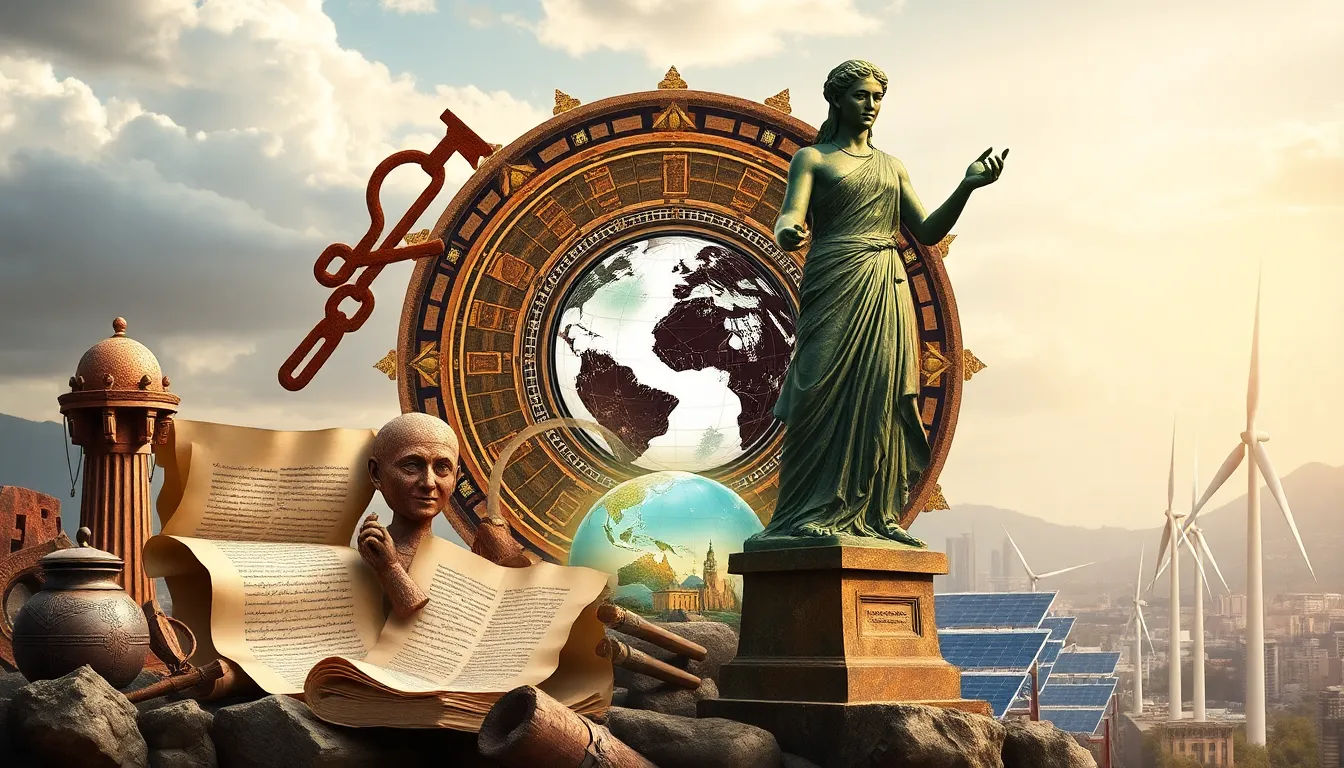Ever wondered what the future holds? From flying cars to robot pets that actually listen, the predictions can be both wild and wildly entertaining. As technology races ahead, it’s easy to get swept up in the excitement of what’s next. But let’s be honest: some predictions sound like they were pulled straight from a sci-fi movie, while others seem eerily close to reality.
Table of Contents
ToggleOverview of Predictions of the Future
Predictions about the future capture the imagination and inspire curiosity. Flying cars represent a popular vision, often depicted in movies and books. Artificial intelligence offers another area of prediction, promising enhanced efficiency across various industries. Smart homes, a concept gaining traction, integrate technology to improve daily living.
Space exploration sparks interest with its potential for colonization beyond Earth. New findings suggest that companies are preparing for missions to Mars and beyond. Renewable energy technologies, like solar and wind power, play a crucial role in efforts to combat climate change. Cleaner energy solutions seem essential for future sustainability.
Medical breakthroughs also create hope in predictions for the future. Gene editing technologies, such as CRISPR, show promise in disease prevention and treatment. Wearable health devices can monitor vital signs, contributing to personalized healthcare approaches.
Digital currencies, with their ability to transform economies, present another fascinating prediction. Blockchain technology provides secure transaction methods, enabling peer-to-peer exchanges. In education, online learning platforms equalize access to resources for students worldwide.
Urban planning trends suggest smarter city infrastructures, enhancing public services and quality of life. Developments in transportation, such as autonomous vehicles, could reduce traffic accidents and emissions. Experts from various fields continuously explore these predictions, reflecting society’s evolving aspirations and challenges.
Historical Context of Future Predictions

Predictions about the future have fascinated societies throughout history. They often reflect humanity’s hopes and concerns regarding progress and change.
Ancient Predictions
Ancient civilizations often sought to predict the future through various methods. From astrology to prophetic texts, cultures like the Babylonians and Greeks emphasized celestial movements to forecast events. The Oracle of Delphi provided divine insights, while Roman augurs interpreted bird movements to make predictions. These practices weren’t merely superstitious; they carried significant weight in decision-making processes for leaders and communities. Predictions from these eras highlighted societal values and anxieties, laying a foundation for future forecasting methods.
Modern Predictions
Modern predictions focus on technological advancements and societal changes. Science fiction often portrays futures influenced by innovations like artificial intelligence and biotechnology. Authors such as Isaac Asimov and Arthur C. Clarke have shaped how contemporary audiences perceive future possibilities. Today, predictions arise from data analysis and expert insights, relying on trends in various sectors. Significant emphasis continues on renewable energy technologies, urban planning, and healthcare advancements. Expert panels and think tanks now employ rigorous methodologies, transforming predictions into informed forecasts that guide policy and investment decisions.
Emerging Trends Influencing Future Predictions
Emerging trends shape future predictions across multiple sectors. Observers note significant shifts in technology and environmental factors that influence societal changes.
Technological Advancements
Innovations in technology drive many current predictions. Artificial intelligence systems continue to evolve, improving efficiency in various industries, including healthcare and finance. Robotics plays a crucial role in automating tasks, leading to discussions about labor markets and job displacement. The integration of the Internet of Things (IoT) creates interconnected devices that enhance user experiences in smart homes and cities. Experts foresee 5G networks revolutionizing communication, enabling rapid data transfer and facilitating advancements like autonomous vehicles. These technological strides provide a foundation for many of the exciting predictions about future lifestyles and capabilities.
Environmental Changes
Increasing awareness of environmental concerns influences future trends significantly. Climate change acts as a primary catalyst for developing renewable energy sources like solar and wind power. Major industries are investing in sustainable practices to reduce carbon footprints and adhere to stricter regulations. Innovations in energy storage and distribution enhance the efficiency of clean energy. This shift towards sustainability fosters new economic models, with authorities prioritizing green technologies. Furthermore, urban planning integrates greener spaces, stimulating discussions about livable cities in light of environmental resilience. These changes reflect a growing commitment to combating climate change and ensuring a sustainable future for generations.
Popular Predictions for the Future
Predictions about the future reveal trends shaping society and the economy. Experts pinpoint specific changes likely to occur as technology and environmental factors evolve.
Societal Changes
Increased connectivity through technology influences how communities interact. Online platforms foster global communication and collaboration, impacting social dynamics. Remote work reshapes office cultures, allowing companies to access diverse talent pools. Growing emphasis on mental health encourages new frameworks for support and wellbeing. Additionally, smart cities integrate technology into daily living, enhancing convenience and sustainability. Environmental awareness cultivates collective responsibility, prompting shifts in consumption and lifestyle choices. Predictions highlight a transition towards inclusivity, with rising movements advocating for marginalized groups. Overall, emerging societal changes reflect evolving values and aspirations.
Economic Outlook
Economic transformations forecast substantial shifts driven by technology. Digital currencies grow increasingly popular, challenging traditional banking systems. Blockchain technology enhances transaction transparency and security, impacting various industries. Demand for renewable energy sources drives investments in sustainable practices, creating green jobs. Automation and artificial intelligence streamline operations, shifting labor needs. Workforce adaptation becomes essential as many sectors evolve. Consequently, educational institutions focus on skill development to prepare individuals for future roles. Experts predict a rise in gig economy structures, allowing greater flexibility in employment. Overall, the economic landscape is set for considerable evolution in response to technological advancements and environmental priorities.
Challenges in Making Accurate Predictions
Making accurate predictions poses significant challenges due to various factors.
Uncertainty and Variability
Uncertainty plays a crucial role in the prediction-making process. Environmental changes introduce unpredictability, impacting the accuracy of forecasts. Market trends often shift unexpectedly, making financial predictions difficult. Technological advancements also evolve rapidly, with new innovations emerging regularly and rendering previous predictions obsolete. Data limitations further complicate this situation, as incomplete or inaccurate information leads to flawed assessments. Variability in human behavior contributes to unpredictability, affecting everything from consumer spending to political outcomes. For example, sudden shifts in public opinion can alter market dynamics overnight. With these considerations, it’s evident that uncertainty and variability significantly influence the reliability of predictions.
The Role of Human Behavior
Human behavior profoundly affects predictive accuracy. Individuals respond variably to external factors, adding complexity to forecasting models. Emotional responses often drive decisions, leading to unpredictable market movements. Shifts in societal values, influenced by cultural changes, also impact long-term forecasts. For instance, increasing interest in sustainability can lead to unexpected consumer trends. Experts rely on behavioral data for better insights, but human actions remain inherently unpredictable. Misjudging public sentiment can result in misguided predictions, underscoring the importance of understanding behavioral nuances. Addressing these challenges requires continuous adaptation and a deeper analysis of human behavior’s role in shaping future events.
The future holds immense possibilities shaped by technological advancements and societal shifts. As innovations continue to emerge they promise to redefine daily living and enhance connectivity. The commitment to sustainability and renewable energy is more vital than ever as society grapples with climate challenges.
While predictions may vary in accuracy the excitement surrounding them fuels imagination and progress. Experts across various fields are dedicated to navigating uncertainties ensuring that humanity adapts to the evolving landscape. Embracing change will be essential as individuals and communities prepare for the transformative experiences that lie ahead.


